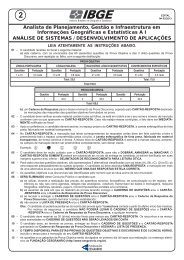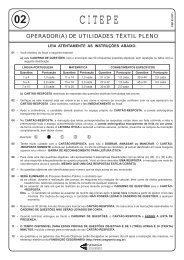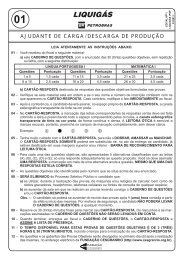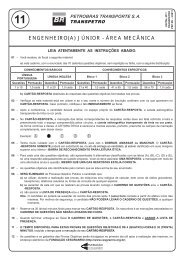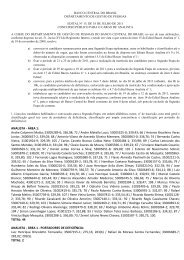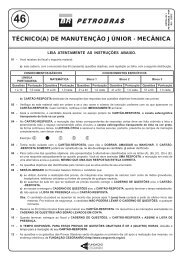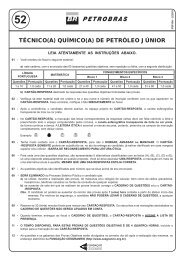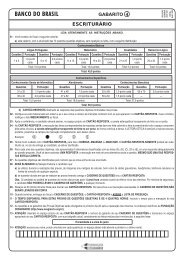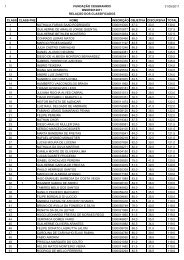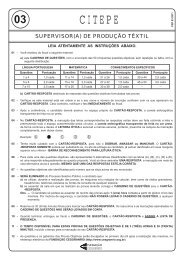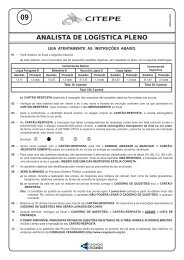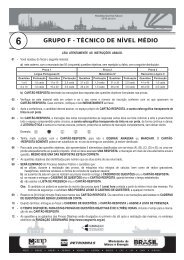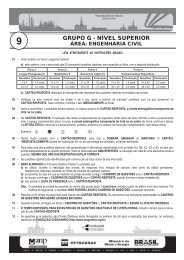PROVA 14 - ANALISTA - ANÁLISE DE PROJETOS III ... - Cesgranrio
PROVA 14 - ANALISTA - ANÁLISE DE PROJETOS III ... - Cesgranrio
PROVA 14 - ANALISTA - ANÁLISE DE PROJETOS III ... - Cesgranrio
You also want an ePaper? Increase the reach of your titles
YUMPU automatically turns print PDFs into web optimized ePapers that Google loves.
LÍNGUA ESTRANGEIRA (INGLÊS)<br />
Don’t spend all your time at the office. Take a break.<br />
5<br />
10<br />
15<br />
20<br />
25<br />
30<br />
35<br />
40<br />
45<br />
50<br />
<strong>ANALISTA</strong> - <strong>ANÁLISE</strong> <strong>DE</strong> <strong>PROJETOS</strong> <strong>III</strong><br />
By Kim Painter, USA TODAY, April 7 th , 2011<br />
Remember the lunch hour? In a more relaxed,<br />
less plugged-in era, office workers would rise up<br />
midday to eat food at tables, gossip with co-workers,<br />
enjoy a book on a park bench or take a walk in the<br />
sun. Can it still be done, without invoking the scorn<br />
of desk-bound colleagues or enduring constant<br />
electronic interruptions? It can and should. Here are<br />
five ways to break free:<br />
1. Give yourself permission.<br />
As the hair-color ads say, “You’re worth it.” Taking<br />
a break in the workday is more than an indulgence,<br />
though: It’s a way of taking care of your body and<br />
mind, says Laura Stack, a time-management expert<br />
and author who blogs at theproductivitypro.com. “You<br />
have to eliminate the guilt and remind yourself that<br />
the more you take care of yourself, the better you are<br />
able to take care of others,” she says. “We have to<br />
recharge our batteries. We have to refresh. It’s OK.”<br />
2. Get a posse.<br />
“Indeed, many people are wishing they could<br />
just peel themselves away, but they don’t have the<br />
discipline,” Stack says. Thus, invite a co-worker to<br />
take daily walks with you or a group to gather for<br />
Friday lunches. Pretty soon, you’ll be working in a<br />
happier place (and feeling less like a shirker and more<br />
like a leader).<br />
3. Schedule it.<br />
Put it on your calendar and on any electronic<br />
schedule visible to co-workers. “Code yourself as<br />
‘unavailable.’ Nobody has to know why,” says Laura<br />
Vanderkam, author of 168 Hours: You Have More<br />
Time Than You Think. And, if a daily hour of “me time”<br />
seems impossible right now, then commit to just one or<br />
two big breaks a week. Or schedule several 15-minute<br />
leg-stretching, mind-freeing breaks each day. Keep<br />
those appointments, and spend them in “a cone of<br />
silence,” without electronic devices, Vanderkam says.<br />
4. Apply deadline pressure.<br />
The promise of a lunch break could make for a<br />
more productive morning: “Treat it as a deadline or a<br />
game,” Stack says. Pick a meaty task or two that must<br />
be finished before lunch and dive in. Plan what you’ll<br />
finish in the afternoon, too. That will free your mind to<br />
enjoy the break, Vanderkam says.<br />
5. Eat at your desk.<br />
That’s right: If you can’t beat them, seem to join<br />
them. If you really don’t care about eating elsewhere,<br />
“pack your lunch and eat it at your desk, and save<br />
the time for something you’d rather do,” whether it’s<br />
going to the gym or sneaking out to your car to read,<br />
Vanderkam says. (But remember, you still have to<br />
schedule this break.) While most co-workers care less<br />
6<br />
55<br />
about your habits than you think they do, she says,<br />
“this has the extra advantage that you can be seen<br />
eating at your desk.”<br />
.<br />
Access on April 7 th , 2011. Adapted.<br />
11<br />
The author’s main purpose in this text is to<br />
(A) warn readers against working all day without having<br />
lunch.<br />
(B) list five things all office workers should do to get a<br />
promotion.<br />
(C) argument in favor of eating lunch in the office to save<br />
more time for gym classes.<br />
(D) explain why readers should get rid of their electronic<br />
devices for fifteen minutes every day.<br />
(E) convince readers to have a healthier job routine by<br />
including some time away from work.<br />
12<br />
In the fragments, “office workers would rise up midday…”<br />
(lines 2-3) and “ ‘You have to eliminate the guilt…’ ” (lines <strong>14</strong>-<br />
15), the verb forms in bold express the ideas, respectively,<br />
of<br />
(A) necessity – suggestion<br />
(B) habit in the past – obligation<br />
(C) possibility – hypothesis<br />
(D) ability – probability<br />
(E) intention – inference<br />
13<br />
The author uses the fragment “Code yourself as<br />
‘unavailable.’ ” (lines 29-30) to mean that<br />
(A) work mates must learn that you are not to be disturbed<br />
at any time.<br />
(B) nobody needs to ask you why you are not at your desk<br />
at a certain hour.<br />
(C) workers should predict when their manager’s electronic<br />
schedules will not be available.<br />
(D) all electronic schedules and agendas must be seen by<br />
the team members who share your office.<br />
(E) professionals should assign periods in which they will<br />
be unreachable by their colleagues at work.<br />
<strong>14</strong><br />
In the excerpts “The promise of a lunch break could<br />
make for a more productive morning:” (lines 39-40) and<br />
“whether it’s going to the gym or sneaking out to your<br />
car to read,”(lines 49-50), the verb phrases ‘make for’ and<br />
‘sneaking out to’ mean, respectively<br />
(A) bring about – slipping away to<br />
(B) call off – hurrying on to<br />
(C) get rid of – leaving from<br />
(D) fight off – coming out of<br />
(E) put up – escaping from



